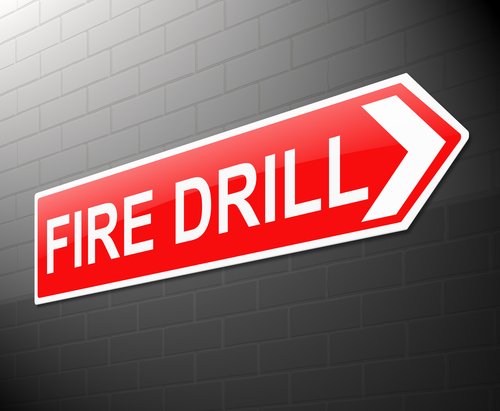
With all of the information and gear available, being prepared for everything seems like an insurmountable task. You can spend a lifetime, and a small fortune, preparing for the worst situations that your mind can come up with. Many people get wrapped up in this and waste a lot of time and energy worrying about what could happen. It is easy to be caught in the riptide of information and advice, but what most people don’t realize is that prepping is actually very simple. If you can wade through the flurry of what-ifs, you will find that you are actually better prepared because you have not wasted a good portion of your energy on worry. The best way to approach this is the same way we tackle a huge juicy steak, one delicious bite at a time.
When you think about it, we have all begun prepping already. As children, we have all done fire drills (or duck and cover drills for the older folks) to prepare for what may happen. These were effective because there was a plan in place and everyone knew what to do. Quintessentially, prepping is about planning. You should write up plans for small emergencies that may befall your household. You can begin this task by mapping out where the extra flashlights, or bandages are. Create a plan for a three-day power outage. Make sure that you have enough resources to keep the members of your household warm, fed, and safe. Some excellent items for a 72-hour kit are flashlights, a radio, food, water, medications, cash, a small first aid kit, and any important documentation, such as identification, and/or insurance information. Make sure that your plans are well thought out and understood by all members of the household.

Try to imagine other events that could happen which would have a negative effect if you were not prepared. You should already have a plan set up in case of a house fire, but do you have some cash stashed away in case of job loss? There are many things that can go wrong in life and having the forethought to prepare for them in advance will help you to navigate the situation easier.
Starting to prepare your household for an emergency can be as simple as picking up a few extra cans of food during your weekly grocery shopping trip. You will want to be patient and space your purchases out so as not to shock your finances. Make sure that you always work within a budget so that you do not overspend. Consider couponing as a way to help stretch your dollar a little further. If you have a coupon for beans, pick up a few cans instead of one. Stocking up on food is important, but other items can also be assets. If your household will use it, what is the harm in having four years’ worth of shaving cream? In a total SHTF situation, you may even be able to trade it. Don’t forget water! Water can be purchased and stored in the large jugs intended for water coolers. Be sure to have a gallon available per day for each person.

Brainstorm all of the things that have a probability of happening to your household and prepare for them accordingly. After you feel prepared for those things, you can widen your preparatory circle to events that may affect your area. You might live in an area prone to tornados, hurricanes, or ice storms. Prepare for these events the best you can, or develop a plan to bug out of the area should the weather take a turn for the worse. Your bugout plan should detail which supplies will have to move with you and the responsibilities of each member of your team. Decide which vehicles will be taken and how best to load them. Anything thought out in advance will make the bugout run smoother.
Imagine that you have already prepared your house, but you are away from it. You can create an EDC (or Every Day Carry) bag, which will have very tiny comforts to get you through your workday. Many women have these in their purses and don’t even realize it. These should have very basic items like hand sanitizer, Band-Aids, safety pins, pain reliever, etc. Next, you will want a Get Home Bag. This should have tools essential to get you home, should you lose your vehicle for some reason. This can contain small cans of food, a couple of bottles of water, a basic first aid kit, some cash, and maybe even a fire starter or mylar blanket. Try to always keep your gas tank at least half full to avoid being stranded.
The most important thing to remember when you are prepping is that the supplies are tools that are only as good as their user. You can spend a fortune on survival gear, but if you do not know how to use it, it will be rendered useless. Knowledge is the best prep that you can possibly stockpile. You can start practicing with magnesium fire starters. You can build a lean to in the back yard for practice. The more you research and apply what you have learned through practice, the better you will become.
Remember to start small, and then continue to develop. This will keep the lofty goal from overwhelming you. As you continue in the prepper lifestyle, you will become more skilled in identifying risk and anticipating need, so as to preemptively combat the negative situation. Be advised that there is no finish line. This is a continuing pursuit that has no determinable end. There is not a certain combination of skills and supplies to collect so that you no longer have to look forward. Just take it one small step at a time, and do not become overwhelmed. Always remind yourself that you can do anything you set your mind to.
For more resources and training, follow us @survivalist.com
